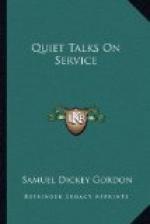You see I was not a graduate in this don’t-worry school. I’m not yet; still studying; expect to enter for post work when I do graduate. The school is still open; open to all; instruction given individually only; the Teacher has had long experience Himself on the earth, in the thick of things.
Well, I said as I stood a moment in the thick crowd, “Master, you know where they are. Please take me to them. Maybe I should have been more careful about the appointment, but I was tired at the start. Please—thank you.” And in less time than it takes to tell you I met them right in the thick of the great crowd. And I felt sure that Peter got his putting of it straight when he said of the Master, “He has you on His heart.”
Paul’s Prison Psalm.
Did Paul follow his own rules? The best answer to that is this little four-chaptered epistle where the rules are found. Philippians is a prison psalm. The clanking of chains resounds throughout its brief pages. At one end is Philippi; at the other Rome. Here is the Philippian end. In the inner dungeon of a prison, dark, dirty, damp, is a man, Paul. His back is bleeding and sore from the whipping-post. His feet are fast in the stocks. His position is about as cramped and painful as it can be. It is midnight. Paul would be asleep for weariness and exhaustion, but the position and the pain hinder.
Does no temptation come to him? He had been following a vision in coming over to Philippi. This is a great ending to the vision he’s been having. Did no such temptation come? Very likely it did. But Paul is an old campaigner. He knows best what to do. He begins singing. His music is pitched in the major too. Most likely he is singing one of the old Hebrew psalms that he knew by heart. It was a psalm of praise. That is one end of this epistle.
At the other end Paul is a prisoner at Rome. As he sits dictating his letter, if he gets tired and would swing one limb over the other for a change, a heavy chain at his ankle reminds him of his bonds. As he reaches for a quill to put a loving touch to the end of the parchment, again the forged steel pulls at his wrist. That is the setting of Philippians, the prison psalm. What is its key word? Is it patience? That would seem appropriate. Is it long-suffering? More appropriate yet. Some of us know about short-suffering, but we are apt to be a bit short on long-suffering. The keyword is joy, with its variations of rejoice, and rejoicing.
And notice what joy is. It is the cataract in the stream of life. Peace is the gentle even flowing of the river. Joy is where the waters go bubbling, leaping with ecstatic bound, and forever after, as they go on, making the channel deeper for the quiet flow of peace. Paul had put his no-worry rules through the crucible of experience. He follows the Master in that. These three rules really mean living ever in that Master’s presence. When we realize that He is ever alongside then it will be easier to be




